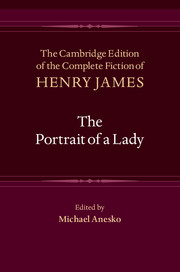Book contents
- Frontmatter
- Contents
- List of Illustrations
- Acknowledgments
- List of Abbreviations
- General Editors’ Preface
- General Chronology of James’s Life and Writings
- Introduction
- Textual Introduction
- Chronology of Composition and Production
- Bibliography
- The Portrait of a Lady
- Glossary of Foreign Words and Phrases
- Notes
- Textual Variants
- Emendations
- Appendices
Chapter 44
Published online by Cambridge University Press: 11 April 2021
- Frontmatter
- Contents
- List of Illustrations
- Acknowledgments
- List of Abbreviations
- General Editors’ Preface
- General Chronology of James’s Life and Writings
- Introduction
- Textual Introduction
- Chronology of Composition and Production
- Bibliography
- The Portrait of a Lady
- Glossary of Foreign Words and Phrases
- Notes
- Textual Variants
- Emendations
- Appendices
Summary
THE Countess Gemini was often extremely bored—bored, in her own phrase, to extinction. She had not been extinguished, however, and she struggled bravely enough with her destiny, which had been to marry an unaccommodating Florentine who insisted upon living in his native town, where he enjoyed such consideration as might attach to a gentleman whose talent for losing at cards had not the merit of being incidental to an obliging disposition. The Count Gemini was not liked even by those who won from him; and he bore a name which, having a measurable value in Florence, was, like the local coin of the old Italian states, without currency in other parts of the peninsula. In Rome he was simply a very dull Florentine, and it is not remarkable that he should not have cared to pay frequent visits to a city where, to carry it off, his dulness needed more explanation than was convenient. The Countess lived with her eyes upon Rome, and it was the constant grievance of her life that she had not a habitation there. She was ashamed to say how seldom she had been allowed to go there; it scarcely made the matter better that there were other members of the Florentine nobility who never had been there at all. She went whenever she could; that was all she could say. Or rather, not all; but all she said she could say. In fact, she had much more to say about it, and had often set forth the reasons why she hated Florence and wished to end her days in the shadow of St. Peter’s. They are reasons, however, which do not closely concern us, and were usually summed up in the declaration that Rome, in short, was the Eternal City, and that Florence was simply a pretty little place like any other. The Countess apparently needed to connect the idea of eternity with her amusements. She was convinced that society was infinitely more interesting in Rome, where you met celebrities all winter at evening parties. At Florence there were no celebrities; none at least one had heard of. Since her brother's marriage her impatience had greatly increased; she was so sure that his wife had a more brilliant life than herself.
- Type
- Chapter
- Information
- The Portrait of a Lady , pp. 431 - 444Publisher: Cambridge University PressPrint publication year: 2016

